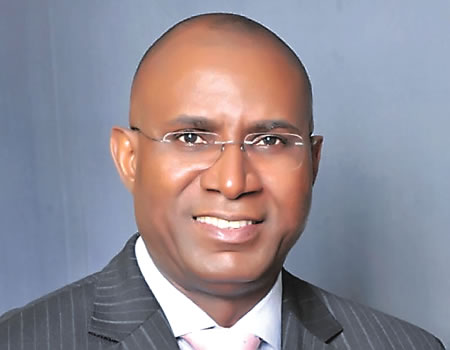There’s a bill in the Senate concerning electoral offences and we were made to understand that you have been the one pushing that bill. We want you to throw more light on that?
We’ve had two bills: the first bill basically addresses all the lapses in the Electoral Act. You all know how I got to the Senate. We saw the weaknesses in the Electoral Act; we figured that the reason these electoral bandits were able to get away with some of these robberies were because of those lapses. So, the first thing I sought to do as a Senator was to get my colleagues together. I wrote the bill to address those lapses. The principal lapses that we discovered that we felt needed to be addressed was this issue of might is right – thugs coming in, seizing electoral materials and writing results and we felt that there’s going to be a way to checkmate that and the best way was the innovation that INEC came up with which was the card reader. Some of us relied on the use of that card reader because we felt that if the card reader was used for the purpose of accreditation, it is the best way to determine the number of people who actually were accredited and who actually voted, but of course some people still sought to circumvent that, the issue became whether or not the card reader is even legal. We had divergent opinions from the court until the Supreme Court eventually ruled that as innovative and good as that invention is, Section 49 of the Electoral Actat the time did not recognise it; that the only device or document recognised by the Electoral Act for purpose of accreditation was voter’s register and the Supreme Court proceeded to invite us, the National Assembly that if we like that equipment so much, we should do something about it.
So, I took it upon myself to accept that invitation on behalf of the National Assembly by crafting the Electoral Act to include the card reader. That is one of the main features of that very bill, but moving from that, we also felt that we’ve seen instances where the opposition will just sit back because they have the might, they control the bad boys, the police, they control so many of the apparatus and do not allow you to do your own voting at the unit level and go waylay you at the collation centre and when the results come in, they say APC 300 votes, PDP 20 votes, they will now put 2 in front of the 20 to make it 220. They can’t do that at the unit level because they have no way to determine the total number of people who voted across the entire ward, but once they get to the collation centre, they are able to do that mathematics. So, we now felt that rather than allow them to do this at the collation centre, let us make the unit the helping centre of the entire electoral exercise. So, the accreditation and voting and collation and the transmission should all take place at the unit level, so by doing that, we addressed a lot of those issues that created problem for us during the 2015 elections.
What about the amendments on candidacy, nominations and others?
Yes, there are also other issues dealing with candidacy, nominations, the influence and the power of the political parties on who should become a candidate, what are the requirements and so on. We saw to it that even though there is also a lot of litigation in so many areas as to requirements for qualification or disqualification for nominations, we felt that we should rely only on the constitutional provisions because if you check the constitution, it is not very clear on what you are supposed to possess for you to qualify to run for office. It also goes further to list out what will disqualify you. So, we made sure that it is only those requirements in the constitution that deals with qualification and disqualification that are allowed to go into the Electoral Act so we embedded all of these in the Electoral Act. Now, a politician cannot come and say you are disqualified because you didn’t pay tax like the Kpeazu litigation case in Abia State, but if you also check the constitution, payment of tax even though it’s a responsibility of every citizen, is not a requirement to run for political office, so we streamlined everything.
We also dealt with how much a political party will charge by way of nomination. We’ve had circumstances where after you’ve paid the fee for the form, they’ll say there is a party development fee you are supposed to have paid to your ward, local government and state, so many different fees, by the time you finish, you can almost go bankrupt and we said ‘No,’ we want to open up the political space for everyone that wants to contest. We don’t want money to be a barrier so we reduced the fee. We’ve pegged the fee; we’ve indicated how much a party can charge; they cannot add or remove one dime. We also went further to say, that there is so much impunity in the administration of the electoral system where ad hoc officers are selected, especially university lecturers and their professors. For some reasons, there is this honour code that because they are lecturers, they’ll do the right thing. Ideally, they ought to do the right thing, but when they come in here, they are as bad as we are. Some of them, they collect N500, 000 and they falsify results for you and nothing happens. You now find politicians struggling for which lecturer should be posted to them as ad hoc officials for electoral purposes.
So, we said let us make this thing unattractive. We now created sanctions so that if a lecturer, who is an ad hoc officer, falsifies the results or does anything unethical and illegal contrary to the electoral acts and existing laws either in the unit, ward or anywhere has committed a crime and he goes to jail for five years, without an option of fine. Now a lecturer that has a job, when you offer him N500,000 or N1m to help you write a result, he has to think about the N1m on one hand and the five-year jail term on the other hand, he has a choice to make. If he elects to go to jail, he is free but I doubt it very much that there’s a lecturer today in any Nigerian higher institution who will elect to go to jail just because of N1m or even N5 million and I don’t think there are so many politicians out there who can offer more than N10 million to corrupt these people. So, we’ve addressed all of that.
We’ve created all those crimes and having created it, we brought it to second bill, that’s the one that passed through the Second Reading a few days ago. I also wrote that bill. That is the Electoral Offences Commission Bill. So, we set up a commission, call it the EFCC of electoral crimes if you like, but that is the idea. What the EFCC is doing in terms of financial crimes is what we are seeking to achieve by setting up the Electoral Offences Commission. Their job will be to collate, investigate and arrest and prosecute culprits of these crimes before the regular court; that is the main essence of the second electoral bill. And we are very confident that we will get concurrence in the House because this is something that affects everybody and I can also tell you that Mr President is equally very interested in it because I discussed it with him including the earlier one that we passed. In fact, President Muhammadu Buhari’s position is that if that electoral had passed in 2003, he would have served as president and retired by now because a combination of both statutes will lead us effectively to one man one vote.
In this whole thing, don’t you think the opposition, the PDP, could equally shut it down?
I don’t believe that there is anybody who is not a victim here, even within the PDP, there are still some good people. I don’t want to mention names, but at least, I know of certain people in PDP government, especially in Delta North in the Ndokwa axis for instance at the House of Assembly level who are very popular, who can win election any day, I’m just giving you an example, I’ve not mentioned names but they are good people, good electoral materials who, on a good day because of the services they’ve rendered to their community, would receive the votes graciously from the electorates. It is cheaper for them to have the electorates vote for them than pay so much money to the powers that be within their own political establishment to get their tickets and have them declare them winner knowing full well that they will still have to face challenges in court. So, when you know what side of the divide you are in, that you are accountable to the electorate, that if you do well to the electorate, the electorate will show you love by returning you to the Senate or whatever political office you are running for, you will encourage and support the bill. Even in the Senate, it was both sides, it was supported by both APC and PDP and even in the House, I think the majority of PDP are in support of it, it’s not an APC thing, we just want to sanitise the political system for everybody.
Some of your aides have condemned the recent DSIEC law that was signed by Governor Ifeanyi Okowa. Do you think anything is wrong with the present bill and what is the APC doing to see that the law is reviewed?
Talking about the bill just signed into law, my understanding is that there are a lot of inconsistencies with the federal legislative enactments and as lawyers, it is very rudimentary that where provisions of a state law is in conflict with that of a federal piece of legislation, the state law will gives way. Some of the inconsistencies have been pointed out to the state government I am told, but I don’t know what they are doing to address those concerns, but I am hopeful that at some point, they’ll do the needful because if they don’t do the needful, this is Delta State, we are a kind of professional litigants. I’m sure that at some point, the party will come out and make its position known.
For a very long time now the Delta APC has been in crisis. When will this come to an end vis a vis 2019?
Most of us don’t believe that there is crisis in Delta APC; what you are seeing is just politicking. Everyone has an interest to protect, it could be personal, community, ethnic interest and there’s always a competition on how to acquire power to balance those interests. It could be within the party; it could be inter-party. So, what is happening there is not new. By the time we settle down to decide on a candidate for governorship and other positions, everyone else will fall in line. I don’t believe there is crisis in APC that is not in PDP or any other political party. We are all brothers and friends; we know ourselves. At the end of the day, we’ll all come together and the right thing will be done. What we have right now is pressure groups that some people refer to as factions. I remember back then in PDP those days, there used to be different pressure groups, Wednesday group, Thursday group, committee of friends, UPF, UPD, etc, but at the end of the day, it’s one party. So, we are all in APC. We will all come together and we are going to win. There’s a hunger to claim government house, the people of Delta State are suffering; they want change. They gave Okowa the benefit of the doubt, the man has failed. The teachers, pensioners, civil servants are in pain; they are crying; they can’t even feed themselves; the people are in a hurry to get rid of them; they want to clean Okowa and his crew out of government house in 2019. So, I can assure you we will win 2019; we are hell-bent on winning. All we are seeking right now is how to come up with an acceptable, grassroot candidate that the electorate will own and call their own.






